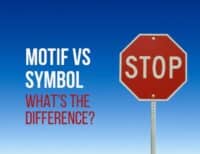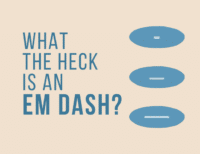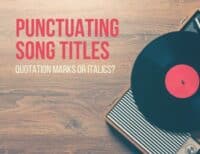I love Weird Al. This mostly stems from my freshman year of college when “White and Nerdy” was all over the William and Mary campus like a sort of rallying cry, because a good number of us were, well, white and nerdy. I will confess to not knowing that “Ridin'” by Chamillionaire was a song at the time. That was an interesting day when that song came on the radio for the first time.
Anyway, Weird Al came out with a new album fairly recently, and my boyfriend sent me a link to his video for “Word Crimes” because, let's face it, it's me we're talking about. For reference, in case any of you aren't as aware of Weird Al's affinity for grammar, he's a self-described grammar nazi, and this song is a clear indication of that fact.
Weird Al's Top Word Crimes
It's impressive how much verbal learning Weird Al throws at you in under four minutes. Let's take a look at the highlights.
Less vs. Fewer
As Mr. Yankovic makes clear (in an impressive infographic), less is used for mass nouns, like liquids or electricity, which can't be quantified by themselves. You can't say that you have two electricities, so you wouldn't use fewer to indicate the amount; you would use less.
Fewer, on the other hand, is used for count nouns, like bottles of water or light bulbs, which can be individually numbered.
Caring Less or Not Caring Less
Just looking at the phrase “I could care less” should tell you that it means you still care. If you're able to care less, then by definition you still care, at least a little bit. You're looking for its more decisive cousin, “I couldn't care less”, which does in fact mean that you straight up don't care.
Textspeak
This is one of my biggest pet peeves, and it apparently bothers Weird Al too. Anytime I see a letter by itself that is trying to be a word (and that letter isn't I or a), I cry on the inside. That “y” is not a substitute for “why”. You're a grown adult. Come on.
Accurate Use of Quotation Marks
You wouldn't believe how frequently business owners put quotation marks around words for emphasis in their signage. This is wrong. Don't do it.
The Optional Oxford Comma
As strongly as Weird Al feels about using “its” or “it's” correctly, he concedes that if you want to leave out the Oxford comma, it's kind of okay. There's no hard-and-fast rule about it, but its omission can sometimes lead to confusion. If it helps to clarify your sentence, considering throwing it in.
What would you say are the worst “word crimes”? Share some of your linguistic pet peeves in the comments.
PRACTICE
You have two options for this practice:
- Write about a teenager who is confronted by Weird Al after committing each of these Word Crimes.
- Write a small story in which you break each these Word Crimes.
Write for fifteen minutes. When your time is up, post your practice in the comments section. And if you post, please be sure to give feedback to your fellow writers.
Happy writing!








I hate people say things like, “Yeah, so, like… It drives me crazy!
I mean: “I hate when people say…” Sorry!
One pet peeve: I’m not going their, not to they’re house
anyway. There just weird.
I cringe when I hear people say ‘those ones’ and ‘these ones’. It just makes me want to say ‘which ones?’.
If I were to write a story based on this prompt, I would write about a non-white teenager growing up in an impoverished community who is astounded by Weird Al’s un-checked privilege in berating strangers based on (as one actual linguist put it) “largely trivial, largely arbitrary standards of linguistic correctness,” apparently completely unaware of how this kind of “grammar nazi” nonsense is used to dismiss the voices of marginalized and oppressed peoples merely because they do not speak “Proper English.”
Here’s an actual linguist grappling with the socio-political implications of Weird Al’s song:
[A] little rumination on Weird Al’s violent reactions against “bad grammar” raises deep and longstanding questions of social equity regarding class, education, race, age, ethnicity, gender, and how these relate to languages, dialects, and social registers. There is ample research on these issues (which any sociolinguist could point you to), but the upshot is that the notion of “Proper English” typically serves to prop up the already-privileged speakers whose native language variety it is (sort of) based on. This puts speakers whose native language variety does not approximate “Proper English” at an immediate disadvantage in society, the same way that privileging Whiteness puts those who are not White at an immediate disadvantage in society. It is not the linguistic differences themselves that do this (just as it is not the racial/ethnic difference themselves that determine privilege), but the *attitudes* about them. This is why many linguists are having a hard time laughing with Word Crimes: to do so feels like complicity in an ongoing project of linguistic discrimination that intersects with class, race, and other kinds of discrimination.
Weird Al has produced some very funny parody songs in his career, but he missed the mark here. This could have been a light hearted poke at the idiosyncracies of English, across the board. Unfortunately he took it to a level where he is actually calling people stupid. I spent the last ten years working in Special Ed, and I admit I am offended by his liberal use of words like “spastic” and “mouth breather”. I think it is legitimate to open a discussion of language, and note differences. If our language continues branching out, at what point are we unable to communicate? Intelligent conversation, yes. Mocking and insulting those who speak differently? No.
I cringe when I hear people using “like” in every sentence. “I was like hungry.”
What does that mean. Are you hungry or not? If you are just “like hungry” how do you really feel?
“It was like, Oh WOW!” What does that mean?
I want to stop and ask people what they mean, but would probably be called a busy body and told to mind my own business. When did this start, and how can teachers get children not to speak this way, that is, if they haven’t succumbed to the habit themselves?
Adelaide
Adelaide you are right. That is such an annoying habit. My perception is that I’m hearing it less often these days. Hopefully it was a passing fad?
Speaking as a teenager, I’m afraid not 😛 It’s an unconscious tic. I think most kids don’t realize how often they use the word “like” incorrectly. My best friend is one of the most intelligent people I know and a brilliant writer but when she talks she says “like” 6 or 7 times in a single sentence. I’m definitely guilty too, of that as well as other weird verbal tics. I try to be as conscious of them as possible so as to kick the habits.
Ha ha. Those of us who are far removed from our teen years do complain about teens’ atrocious speech. Then we turn around and steal your best material. I just asked the hubby, ” ‘Sup?”.
But it’s not just teenagers who say “like” all the time. I hear it everywhere. People begin using it as teenagers and then can’t break the habit. I heard a woman in a doctor’s waiting room making her next appointment. She had to be in her mid-forties, and she used “like” several times.
Adelaide
Ouch! I talk that way like all the time. Ha ha! 🙂
It’s a good point though, Adelaide. I wonder if it will stick around or if it’ll just be a silly fad that we’ll laugh at thirty years from now. On a deeper level, perhaps it is a reflection of our culture nowadays. It’s less decisive, more abstract. I don’t know, but sometimes I think we’re afraid to just say things as we see them.
Anyway, I like my “likes” but I can see how they could be annoying. 😉
Hi Joy,
Why do you like your “likes?” They don’t add any meaning to what you are saying; in fact, if taken litterally, they confuse the meaning.
Adelaide
You’re really making me think about this, Adelaide. I appreciate that. 🙂
The simple answer would be this:
Why does anyone talk the way they do? It’s personality and culture. The “like” slides in between words without me even thinking about it (let’s blame my age for that).
The longer answer…Hmmm…that’s a little harder to explain.
Sometimes I use the “like” automatically when I don’t want to say something the wrong way. Here’s an example:
“It was like the hardest thing I’ve ever done.”
Was it really “the hardest thing I’d ever done?” Maybe it wasn’t. That’s when the “like” slides in. It makes the statement more truthful. It turns the phrase into a metaphor, and it eases my indecisive mind.
I don’t use the “like” in writing.
Writing forces me to be clear. It gives me more time to ponder my words. It helps me realize that the “like” can be reworded more clearly. While I would say the above sentence, I would write it the “proper” way:
“It was one of the hardest things I’ve ever done.”
Thus I write more decisively than I talk, and I don’t see anything wrong with that.
Which brings us to the root of the matter–Is it wrong to talk indecisively?
*Thanks for sharing your pet peeve, Adelaide. We’re all entitled to them. This has been a stimulating conversation, and I must admit, you have some good reasons for despising the “like.” I’m probably going to notice myself saying it now. 🙂
Ah! The likes drive me crazy as well. I think it is an unconscious tick people have. Just as someone ould use the word um they insert like instead. Maybe pointing out what like means and correcting your students when they use the word like will help?
I love words and language, strive to use them properly, and I do cringe when I hear or read obvious mistakes. On the other hand, the reason we speak and write is to communicate, and ultimately, if someone is communicating effectively, isn’t that most important? I’ll use my poor old hubbie for an example (Shhh! He has no idea!). He is the smartest person I know. He thinks quickly and with machine-like precision, is awesomely articulate and persuasive, and also know just what to say to people in any situation. He can dissect and discuss the most complex topic, and his speech is indeed the “King’s English”.
Now that poor man, he can’t write to save his life. His handwriting looks like it is done by a seven year old. His spelling is non-existent. He hates writing and it shows. He is a “verbal” person. However, when he must write, his crummy handwriting and poor spelling don’t change what he has to say. He is still an effective communicator. So, how relevant are his sad scribblings?
I think it is also fair to acknowledge that our language is constantly evolving. That’s why they have to update the dictionaries regularly. When they do, many words considered to be dopey slang show up as new bonafide bits of English. You know, most young people would have no idea how to adjust the antennae on an old television, to improve reception. That’s because the technology has changed. That is a concrete example, and I think we have to acknowledge that, though not concrete, and thus harder to accept, language evolves along with technology and lifestyle too.
I’m not saying we should forget about grammar, syntax, spelling, punctuation, and everything else that gives our language its flexibility and clarity. I fell in love with language through love of reading, and I doubt I would enjoy that very much if every story was a garbled, disorganized mess. I have a dear friend who recently completed a novel. She asked me to read her first draft, and I couldn’t. Shocking, at least to me, this incredibly intelligent, well-read woman must have written hastily, and did not do any editing. Her first chapter was riddled with nouns/pronouns that did not agree, tenses that changed mid-sentence, and long, run-on sentences that led nowhere. I asked her to edit, and then let me read. She didn’t want to, so I had to tell her I literally (yes, Weird Al, “LITERALLY”) could not read it.
I guess I’m arguing both sides of the debate, which does not make me wishy-washy. It means the answer to this debate lies at neither extreme, and is instead somewhere in the middle. We need to preserve our language, and teach it to our children, and somehow make peace with the fact that our language, like so many other parts of our culture, is evolving very rapidly.
The only true word crime I know is the word not written.
The ‘care less’ issue is a good one. Here on the other side of the pond (in the UK) we always say ‘I couldn’t care less’. ‘I could care less’ is a definite Americanism.
Here is a teenager, getting grammar corrections from weird Al.
I look out my parent’s apartment window.
“Is that weird Al?” I say. “I think he’s headed this way.”
I jump off the sofa, gliding across the hard wood floor, pulling the door open. There he stands weird Al himself.
“Are you Brandon Fifer?” He says.
“Yes” I say. “How do you know me?”
“Did you post this article?” He says, pushing the magazine to my face.
“Ahh, yeah. That looks like my name at the end.”
“I can’t believe the grammar errors in here.” He says as he pushes his way into the apartment grabbing a soda from the fridge. I follow him shamefully like a dog with it’s tail between it’s legs. “Have a seat I have several changes for you.”
“But its just a school magazine, whats the point of proper grammar?”
“Theres always a point of having proper grammar. For example in your third paragraph you write..Y would you want to accomplish these things?… Your not texting your friends this is an article, spell the entire word.”
“Okay, I see your point with that one. I wasn’t trying very hard.”
“Theres more,here you state you want fewer electrical currents. What you want to say is less electrical currents, then here you say you could care less about what current is used. What you want to say is you couldn’t care less. Meaning you don’t care at all. Then you use quotation marks all over the place, I don’t even know where to begin with those.”
“I see I may have a lot to learn about grammar.” I say.
“Yeah.” says Al. “We’re going to be here for a while.”